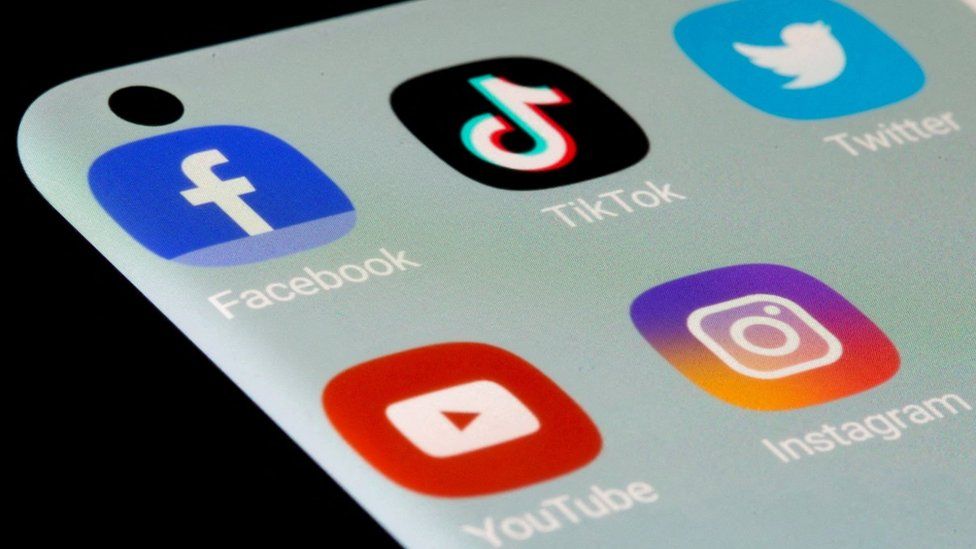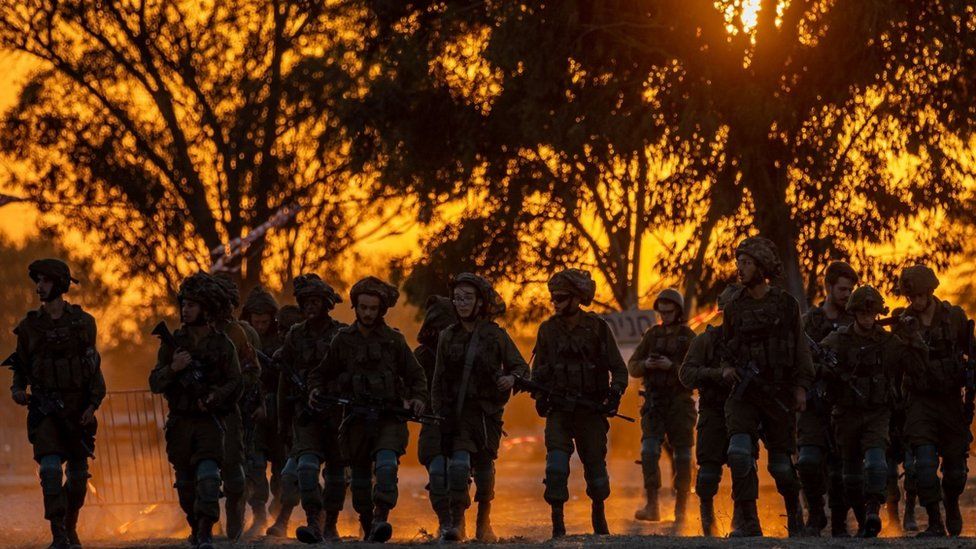Who’s behind Israel-Gaza disinformation and hate online?
 Reuters
ReutersSocial media has been awash with false claims, conspiracy theories and hateful content surrounding what’s happening in Israel and Gaza – and questions over whether inauthentic accounts are being used to manipulate the conversation.
As violence unfolds on the ground, I’ve been looking into who is behind this.
When I opened up my TikTok For You Page earlier this week, I was met with a video showing a young Israeli woman being taken hostage by Hamas fighters on 7 October. The footage was shocking.
When I scrolled through the comments, the reaction was not what I expected.
While some were distressed by the post, other users falsely suggested this footage was not what it seemed.
They said the woman in it is “not a civilian” but a soldier, or that the clips had been staged to frame Hamas.
Some claimed there’s no evidence the group have acted violently towards hostages.
The clip, which has been verified by the BBC, shows a young woman covered in blood being pushed into a car by armed men. It was filmed on the outskirts of Gaza City in Sheijia.
I scrolled through several more videos and posts about hostages on other social media sites and spotted similar comments.
Israeli people are subject to compulsory national service – but evidence suggests many of those taken hostage by Hamas are civilians, like the people featured in these videos. The hostages include festival-goers and children.
Disinformation is not limited to accounts seeking to undermine violence against hostages, either. Profiles supporting the actions of the Israeli government have also shared misleading and hateful content.

One account I came across this weekend shared a video falsely suggesting Palestinian people were faking their injuries in Gaza. The footage was actually from a 2017 report about a makeup artist working on Palestinian films and with charities.
All of these claims were not just shocking to me – they affect the wider understanding of what’s happening.
Successful attempts to distort and confuse the online conversation make it a lot harder to get to the truth of what’s unfolding on the ground if you’re relying on social media for updates.
That can have serious implications for the international community when it comes to investigating allegations of war crimes, providing aid and figuring out what’s happening where.
Sometimes, the source of these misleading posts is easier to identify.
Take, for example, celebrities, like popstar Justin Bieber, who inadvertently shared a post on Instagram asking people to “pray for Israel’ – but used images showing the destruction of Gaza by Israeli forces.
Several accounts on X (formerly known as Twitter) with a track record of pushing conspiracy theories about crises have amplified misleading posts in what seems to be a bid to either downplay or exaggerate what’s happening on the ground.
That includes sharing old videos from different wars and footage from video games, which the accounts claim is from the current situation in Israel and Gaza.
Some very active accounts on X sharing pro-Israel content and anti-Muslim posts appear to be based in India and express support for the country’s Prime Minister Narendra Modi.
I want to try to get to the bottom of the profiles whose identities and locations are less obvious.
Who are the people behind the accounts?
Several of the accounts suggesting that hostages were soldiers rather than civilians seem to belong to real, younger people. They have otherwise shared funny memes or football clips to their profiles.
Some have posted pictures with slogans like “Free Palestine”. When I message them they tell me they are based in Pakistan and the United Arab Emirates.
For some profiles, whether they’re real people is less obvious.
A handful have posted about an eclectic mix of political topics; in support of Russian President Putin and the war in Ukraine, as well as about former US President Donald Trump. Several of these accounts are newly set up or have recently become active.
In the past, both the Israeli government and Hamas militants have faced accusations of trying to distort online narratives with “bot” networks – inauthentic accounts used to repeatedly push divisive or misleading ideas.
According to Cyabra, a company based in Israel that analyses social media, one in five accounts taking part in conversations about the attacks committed by Hamas since 7 October are fake.
“Fake” in this context can mean they are automatically operated – but others could also be run by real people posing under false identities.
The company says they’ve found approximately 40,000 fake accounts, including on X and TikTok.
It says some of these profiles have been spreading misleading claims in support of Hamas and suggesting – for example – that militants were compassionate to hostages in situations where evidence suggests otherwise. That does not rule out the existence of inauthentic pro-Israel accounts, too.
There are clues we can use to identify an account as inauthentic. For example, if a profile is newly set up and is suddenly sharing a large amount of divisive, misleading and at times conflicting content.
Ultimately, though, determining whether a profile is actually fake and who exactly is behind it is a very difficult task. It requires information from the social media companies that journalists don’t often have access to.

More on Israel Gaza war
- Follow live: Latest updates
- Explained: What’s going on in Gaza and Israel, and why now?
- History behind the story: The Israel-Palestinian conflict
- Gaza: What life is like in the Gaza Strip
- Kibbutz massacre: Father saves daughter he had not seen in six years

Pressure on social media sites
Social media sites have been widely criticised over the spread of disinformation this week. The EU is investigating X over the possible spread of terrorist and violent content, and hate speech.
Former Twitter (X) employees have previously told me how the company is no longer able to protect against state-co-ordinated disinformation following layoffs under new owner Elon Musk.
Ray Serrato, who tackled state-sanctioned campaigns at the social media company, told me how his former team was “decimated” after the takeover.
According to him, that means a number of key experts who “covered special regions” – including in the Middle East – and whose job it was to deal with specific co-ordinated disinformation operations, are no longer at the company.
X has not responded to the BBC’s request for comment. The social media site this week said it had removed hundreds of Hamas-affiliated accounts from the platform.
In TikTok’s Community Guidelines, the company says it has “increased dedicated resources to help prevent violent, hateful, or misleading content on TikTok” in relation to the current situation.
The way that disinformation spreads on X, TikTok and other platforms can shape the general public’s view of the situation in both Gaza and Israel.
That in turn could also put pressure on the politicians making big decisions about what’s unfolding.

